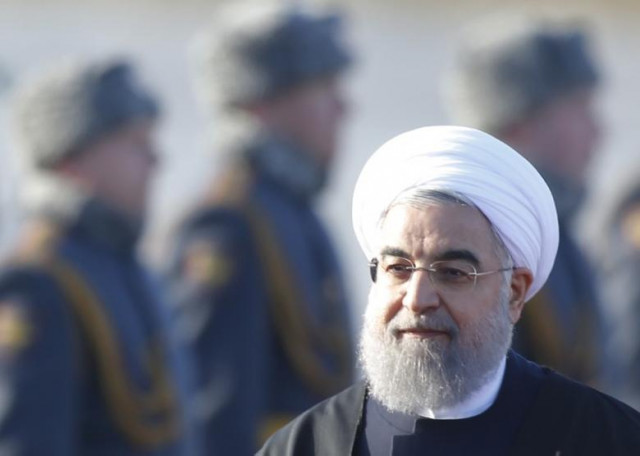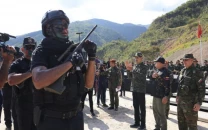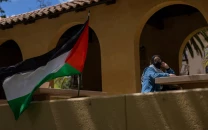Iran's missing reformists are the real heroes at Rouhani rally
Rouhani faces a much tighter race than many expected just a few months ago

Iranian President Rouhani. PHOTO: REUTERS
"Mousavi! Karroubi! Khatami!" they chanted at deafening volume, over and over, at the election rally in a stadium in western Tehran. Those first two names, drawing such passion from the crowd, belong to reformist leaders who have not been seen in public for six years now.
Mir Hossein Mousavi and Mehdi Karroubi - both candidates in the controversial election of 2009 that triggered months of protests after allegations of rigging - were placed under house arrest in 2011, allowed out only for medical treatment. The third is Mohammad Khatami - president from 1997 to 2005 and spiritual head of the reformist movement - who is banned from travelling abroad or appearing in any form in the media.
Rouhani allies win Iran parliament elections second round: media
An immense roar came from the crowd when their images appeared on the screen. The Green Movement, as the protests came to be called, were the biggest Iran had seen in three decades of Islamic revolution, driven by anger over the shock re-election of hardline populist Mahmoud Ahmadinejad. Brutally put down, the regime prefers to call it "the sedition" and the green flags being waved by youngsters in the stadium on Saturday night might normally have attracted the attention of police or militias.
But a slightly more permissive atmosphere prevails six days ahead of a presidential election, when the regime is keen to get as high a turnout as possible to buttress its legitimacy. Only six candidates were allowed to run this year by the conservative-dominated Guardian Council.
Rouhani, a 68-year-old moderate cleric, came from nowhere in 2013 to win a sizeable victory after the tattered remnants of the reformist movement told their supporters he was their best hope for change. He still has the support of liberals for his efforts to rebuild ties with the West and slowly improve civil liberties, even if he has markedly failed to gain the release of Mousavi and Karroubi as he vowed four years ago.
"It was beyond his powers," said Javad, a 30-year-old graduate in the crowd. "He did everything he could."
The president has considerable powers, particularly over the economy, but no control over the conservative-dominated judiciary or security forces, and serves at the pleasure of supreme leader Ayatollah Ali Khamenei. Rouhani dared not speak the name of the jailed dissidents directly in his speech, but received huge cheers when he told the crowd he had not "forgotten his promises". "Either they have been achieved, or I have been prevented from keeping them," he said.
The president has been on the offensive over the past week, framing Friday's vote as a choice between greater freedom and repression. "Let us salute freedom, salute reforms, salute moderation, salute the wise leader, salute Mohammad Khatami," he declared.
Rouhani in, Ahmadinejad out as Iran Guardians pick election candidates
"What Rouhani says is what we have in our hearts," said 28-year-old Hossein, who works in renewable energy.
He was typical of the young, educated crowd packing the stadium - men and women mixed together in a way that is not seen at more conservative rallies. They were joined by well-known artists and sportsmen who have overwhelmingly thrown their support behind the president for a second term.
But the continued stagnation of the economy means Rouhani faces a much tighter race than many expected just a few months ago, with his main conservative rivals - cleric Ebrahim Raisi and Tehran mayor Mohammad Bagher Ghalibaf - making significant inroads in poorer areas.
The thousands gathered for Rouhani on Saturday night may have looked impressive, but many of Iran's 80 million citizens have yet to see much benefit from his austerity measures and outreach to the world. For now, his supporters are enjoying the moment. As the music erupted again inside the stadium, bodies moved and Rouhani's slogan got its own chant: "At the halfway point, we don't turn back!"



1726734110-0/BeFunky-collage-(10)1726734110-0-208x130.webp)















COMMENTS
Comments are moderated and generally will be posted if they are on-topic and not abusive.
For more information, please see our Comments FAQ